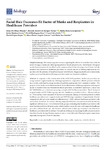Mostrar o rexistro simple do ítem
Facial Hair Decreases Fit Factor of Masks and Respirators in Healthcare Providers
| dc.contributor.author | López-López, Daniel | |
| dc.contributor.author | De-Yñigo-Mojado, Borja | |
| dc.contributor.author | Becerro-de-Bengoa-Vallejo, Ricardo | |
| dc.contributor.author | Losa Iglesias, Marta Elena | |
| dc.contributor.author | Madera-García, Javier | |
| dc.contributor.author | Rodríguez Sanz, David | |
| dc.contributor.author | Calvo-Lobo, César | |
| dc.contributor.author | Angulo-Carrere, María Teresa | |
| dc.contributor.author | San Antolín, Marta | |
| dc.date.accessioned | 2022-03-10T11:39:33Z | |
| dc.date.available | 2022-03-10T11:39:33Z | |
| dc.date.issued | 2021-10 | |
| dc.identifier.citation | De-Yñigo-Mojado, B.; Becerro-de-Bengoa-Vallejo, R.; Losa-Iglesias, M.E.; Madera-García, J.; Rodríguez-Sanz, D.; Calvo-Lobo, C.; López-López, D.; Angulo-Carrere, M.T.; San-Antolín, M. Facial Hair Decreases Fit Factor of Masks and Respirators in Healthcare Providers. Biology 2021, 10, 1031. https://doi.org/10.3390/biology10101031 | es_ES |
| dc.identifier.uri | http://hdl.handle.net/2183/29951 | |
| dc.description.abstract | [Abstract] In response to the current state of the COVID-19 pandemic, healthcare providers are using common surgical masks and filtering respirators in conjunction with the presence of facial hair, which could lead to a large number of particles passing into their respiratory system. The purpose of this study was to determine the fit factor effectiveness of filtering respirators and surgical masks in bearded versus non-bearded healthcare providers. A controlled randomized clinical trial (NCT04391010) was carried out, analyzing a sample of 63 healthcare providers. The fit factors of surgical masks and FFP3 filtering respirators for healthcare providers with (n = 32) and without (n = 31) facial hair were compared. Fit factors were measured during an exercises protocol in which healthcare providers wore surgical masks and FFP3 filtering respirators. Surgical mask fit factor comparisons did not show significant differences (p > 0.05) between healthcare providers with and without facial hair. In contrast, filtering respirator fit factor comparisons showed statistically significant differences (p < 0.01) between both groups, indicating that healthcare providers with facial hair showed lower fit factor scores, which implies a worse fit factor with respect to healthcare providers without facial hair. The fit factor effectiveness of filtering respirators was reduced in healthcare providers with facial hair. The authors of this paper encourage healthcare providers to trim their beards during filtering respirator use or wear full-mask filtering facepiece respirators, especially during the COVID-19 pandemic | es_ES |
| dc.language.iso | eng | es_ES |
| dc.publisher | MDPI | es_ES |
| dc.relation.uri | https://doi.org/10.3390/biology10101031 | es_ES |
| dc.rights | Atribución 4.0 Internacional | es_ES |
| dc.rights.uri | http://creativecommons.org/licenses/by/4.0/ | * |
| dc.subject | Community Health Workers | es_ES |
| dc.subject | Profesionales sanitarios comunitarios | es_ES |
| dc.subject | Filtration | es_ES |
| dc.subject | Filtración | es_ES |
| dc.subject | Masks | es_ES |
| dc.subject | Mascarillas | es_ES |
| dc.subject | Hair | es_ES |
| dc.subject | Vello facial | es_ES |
| dc.subject | Respiratory protective devices | es_ES |
| dc.subject | Respiradores | es_ES |
| dc.title | Facial Hair Decreases Fit Factor of Masks and Respirators in Healthcare Providers | es_ES |
| dc.type | info:eu-repo/semantics/article | es_ES |
| dc.rights.access | info:eu-repo/semantics/openAccess | es_ES |
| UDC.journalTitle | Biology | es_ES |
| UDC.volume | 10 | es_ES |
| UDC.issue | 10 | es_ES |
| UDC.startPage | 1031 | es_ES |
| dc.identifier.doi | 10.3390/biology10101031 |
Ficheiros no ítem
Este ítem aparece na(s) seguinte(s) colección(s)
-
GI-UDISAP - Artigos [192]






